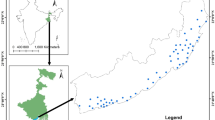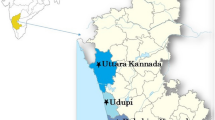Abstract
In recent years among the scientific community, adverse effects of climate change shifted from being a hypothesis to being a reality. Coastal Karnataka prioritized climate variability as a productivity-reducing factor in agriculture and fishery farming. Prevailing unsatisfactory productive services in the agricultural sector and allied industries resulted in degradation of natural resources at the farm level. The adverse impact of climate change and continued fragmentation of landholding have led to poor socio-economic status leading to high dependency on farm income and productivity. The present study is focusing on understanding the response of farmers on decision-making and economic performance due to climate change through face-to-face interviews. The decision ability of the farmers was significantly better among high-crisis management groups than small and marginal farmers, who are having highly diverse decision-making ability. Consequently, economic performance, the benefit/cost ratio of high crisis management group was greater than that of medium and low crisis management groups. Finally, this research study emphasizes the importance of behavioral responses of the farmers in formulating policies and designing strategies to overcome ill effects of the climate-induced crisis.
Similar content being viewed by others
References
Agarwal A (2010) Local institutions and adaptation to climate change, social dimensions of climate change: equity and vulnerability in a warming world. The World Bank, Washington, DC, pp 173–198
Antle JM (2008) Climate change and agriculture: economic impacts 1st quarter. Choices 23(1):9–11
Bartel R, Barclay E (2011) Motivational postures and compliance with environmental law in Australian agriculture. J Rural Stud 27:153–170
Ericksen P (2011) Mapping hotspots of climate change and food insecurity in the global tropics. In: Thornton PK, Notenbaert AM, Cramer L, Jones P, Herrero M (eds) CCAFS Report no. 5 CGIAR Research Program on Climate Change. Agriculture, and Food Security (CCAFS), Copenhagen
Fishman R, Jain M, Kishore A (2013) Groundwater depletion, adaptation, and migration: evidence from Gujarat, India. International Growth Center Working Paper: 5–12
Füssel HM (2010) How inequitable is the global distribution of responsibility, capability, and vulnerability to climate change: a comprehensive indicator-based assessment. Glob Environ Chang 20:597–611
Home R, Balmer O, Jahrl I, Stolze M, Pfiffner L (2014) Motivations for implementation of ecological compensation areas on Swiss lowland farms. J Rural Stud 34:26–36
Hulme M, Jenkins GJ, Lu X, Turnpenny JR, Mitchell TD, Jones RG, Lowe J, Murphy JM, Hassell D, Boorman P, McDonald R, Hill S (2002) UKCIP02 Climate Change Scenarios for the United Kingdom: The UKCIP02 Scientific Report. Tyndall Centre for Climate Change Research, School of Environmental Sciences, University of East Anglia, Norwich, http://www.ukcip.org.uk/scenarios/sci_report/sci_report.html
IPCC (2007) Summary for policymakers: Solomon, S., Qin, D., Manning, M., Chen, Z., Marquis, M., Averyt, K.B., Tignor, M., Miller, H.L. (Eds.), Climate Change 2007: The Physical Science Basis. Contribution of Working Group I to the Fourth Assessment
Isaac M (2012) Agricultural information exchange and organizational ties: the effect of network topology on managing agrodiversity. Agric Syst 109:9–15
Jarvis A, Lau C, Cook S, Wollenberg E, Hansen J, Bonilla O, Challinor A (2011) An integrated adaptation and mitigation framework for developing agricultural research: synergies and trade-offs. Exp Agric 47:185–203
Meinzen-Dick R, Knox A, Place F, Swallow B (2002) Innovation in natural resource management: the role of property rights and collective action in developing countries. Johns Hopkins University Press, Baltimore
Moon K, Cocklin C (2011) Participation in biodiversity conservation: motivations and barriers of Australian landholders, J. Rural Stud 27:331–342
Pelling M, High C, Dearing J, Smith D (2008) Shadow spaces for social learning: a relational understanding of adaptive capacity to climate change within organizations. Environ Plann A 40:867–884
Robert Willows and Richenda Connell (2003) Climate adaptation: Risk, uncertainty and decision-making. UKCIP Tech Rep 3–4
Skoufias E, Rabassa M, Olivieri S (2011) The poverty impacts of climate change: a review of the evidence. World Bank Policy Research Working Paper No. 5622. The World Bank, Washington, DC
Vermeulen SJ, Campbell BM, Ingram JSI (2011) Climate change and food systems. Annu Rev Environ Res 37
Vinaya Kumar HM, Shivamurthy M (2015) Perception of climate change among fishery based farmers’ in coastal region of Karnataka state. Mysore J Agric Sci 49(2):413–417
Ziervogel G, Ericksen P (2010) Adapting to climate change to sustain food security. WIRES Clim Chang 1:525–540
Acknowledgements
The researcher is thankful to the Indian Council of Social Science Research (ICSSR-GOI) for their financial assistance during the study.
Author information
Authors and Affiliations
Corresponding author
Ethics declarations
Funding
This study was funded by ICSSR.
Conflict of interest
The authors declare that they have no conflict of interest
Ethical approval
This article does not contain any studies with animals performed by any of the authors.
Rights and permissions
About this article
Cite this article
Vinaya Kumar, H.M., Shivamurthy, M., Govinda Gowda, V. et al. Assessing decision-making and economic performance of farmers to manage climate-induced crisis in Coastal Karnataka (India). Climatic Change 142, 143–153 (2017). https://doi.org/10.1007/s10584-017-1928-x
Received:
Accepted:
Published:
Issue Date:
DOI: https://doi.org/10.1007/s10584-017-1928-x




